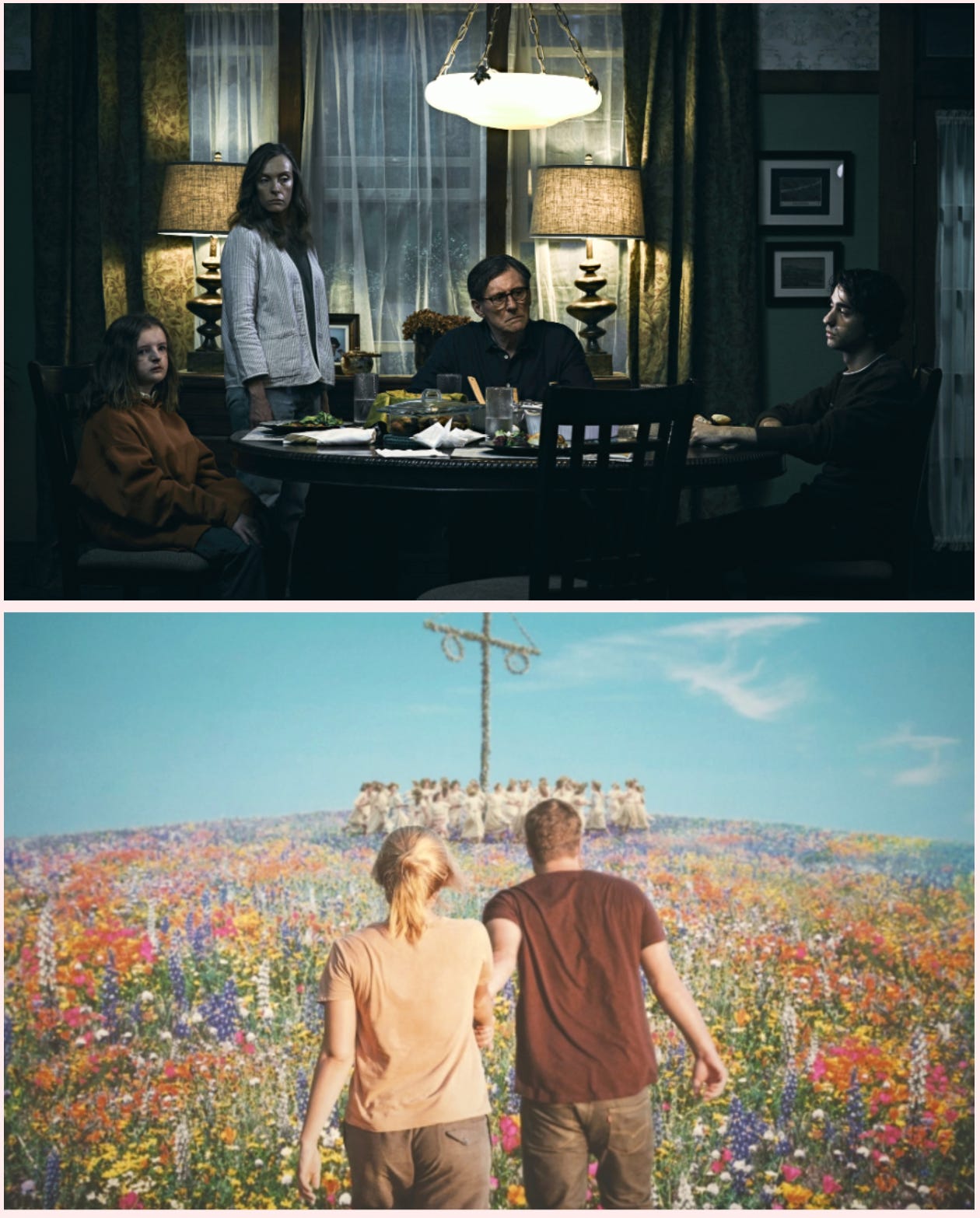Hereditary is significantly less scary and, in its own way, even sweet once you realize it’s a story of a community making great sacrifices to help a young person achieve gender reassignment. Midsommar, also written and directed by Ari Aster, portrays another community--a Swedish cult, this time--that holds and heals a young woman who loses her family. Both movies have grisly (gristly?) images that are awful to watch and last a few beats longer than necessary. If you can see past the butchery, Aster shows us that despite our reliance on family and individual relationships, they are brittle things that fail to address our basic needs and that only a community can make us whole.
Hereditary shows us a family that is mostly absent. The mom, Annie, played by Toni Collette, (who also plays the mom in Little Miss Sunshine, which would be a hilarious misnaming of this movie), is busy constructing creepy dollhouse/diorama art projects. She is so disinterested in her children’s welfare that she sends 13-year-old Charlie off to a high school party with her older brother, fully aware there will be drinking. And she sends her off without her epipen. (It is hilarious to me that one of the eight kings of hell has a nut allergy.)
In addition to her art, Annie is preoccupied by the grief stemming from the recent death of her mother. She is able to open up at a support group she attends in secret. This impromptu, semi-anonymous community addresses her needs better than her family. It is only to this group she can unburden herself of the guilt and rage she feels at a mother who had mistreated her. Annie doesn’t want to trouble her family, but she also doubts they can give her the support she needs.
The dad is off doing whatever it is Gabriel Byrne does, and we don’t see him often. He functions as a red herring since you expect horror to revolve around the guy who was the priest in Stigmata (the original hot priest, years before Fleabag).
No one has time for Charlie, an obviously troubled kid who spends her time alone, doodling and constructing found art pieces that sometimes include pigeon heads. There is, however, a community working in the background to help Charlie in ways her own family cannot. Yes, it is a satanic cult, but as seen in old photos, they adore each other and spend time together, holding what appears to be a black wedding and engaging in other satanic hijinks. You see them growing old together through a sequence of photographs that would make a lovely Hallmark commercial if it wasn’t for their love of Satan. They are the only ones helping Charlie. Not only is the family incapable of doing anything besides barely holding itself together, the family members are completely unaware of her special needs.
In Midsommar, families are fragile and individual relationships inadequate, as Dani, played by Florence Pugh, finds out when her sister kills her parents and herself in a murder/suicide (murder/murder/suicide?). Dani’s boyfriend, Christian, cannot give her the support she needs. Christian is a bit douchey, but anyone would be overwhelmed by her grief.
In Sweden, Dani is embraced by the Hårga, a cult that lives in picturesque isolation. The role of this community is more obvious than the one in Hereditary since it is not hidden or acting in the background. When one member of the group suffers, they all do, as demonstrated early on in a brutal scene involving a cartoonishly large mallet. They wail and clutch themselves, resonating with an old man’s agony. Later, they give Dani the same treatment, holding and consoling her, moaning and then screaming with her. The Hårgas are not overwhelmed by individual grief. For them, suffering is a lighter burden since it is carried by all. It is only with this community that Dani is able to find comfort.
The Hårga share grief, but also joy and even ecstasy. Theirs is the only happiness seen in an otherwise bleak movie. Everyone--even the losers--in the May Queen dance-off is delighted by the experience and emotionally connected with the other dancers. Soon after Christian imbibes a peculiar lemonade, he meets a cadre of older ladies who share the pleasures of a young virgin’s first sexual experience. Dani’s friends are sullen and resentful. They do not spark joy, and, ultimately, they are culled like clutter.
In Midsommar and Hereditary, only communities provide succor and fulfillment. Families and individual relationships cannot cope with trauma much less bring anyone joy. Communities are resilient and survive the deaths of individuals while families crumble. The logic of the horror in both movies comes from the exalted position of the community. Communities are permitted to commit atrocities against individuals because only their needs matter. In Ari Aster’s movies, individuals must be sacrificed--and always brutally--for the community’s sake.
Hereditary / Midsommar
Written and Directed by Ari Aster
2018 / 2019
128 minutes / 147 minutes
English
Stray Thoughts from the Editor
I have a problem. If a movie looks too deeply unsettling, I can’t bring myself to watch it. Ari Aster, the director of the two fine films Dae has recommended, has a reputation that precedes him. His work is lauded for being difficult to watch, but worth the price of admission given, well, everything Dae writes above. To date, I haven’t watched either film, but I have read both Wikipedia articles describing their plots in detail. This outraged Dae. (Fair.) Now that he’s written in depth about these films, I have no choice but to finally take the plunge. This will easily be the scariest recommendation of October. Best of luck to you if you choose to take the journey.
-Jeff



